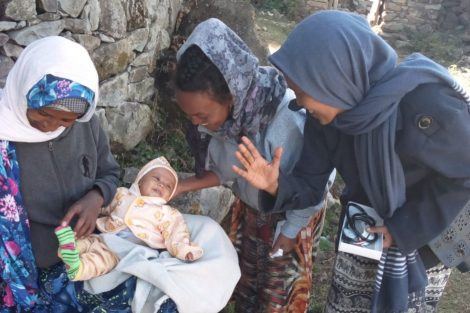May 5, 2021 – Every minute, 21 children under the age of five die around the world, and every two minutes a woman dies in childbirth. Most of the deaths are preventable, according to Grace Chan of Harvard T.H. Chan School of Public Health and Boston Children’s Hospital.
Although there have been significant reductions in maternal and child deaths over the past few decades, the numbers are still stubbornly high in low- and middle-income countries around the globe. Chan, assistant professor in the Department of Epidemiology, leads a program called HaSET—which means “happiness” in Amharic—that aims to address the problem in Ethiopia. HaSET is a cross-institutional collaboration between the Ethiopian Public Health Institute (EPHI), Saint Paul’s Hospital Millennium Medical College (SPHMMC) in Addis Ababa, and the Harvard Chan School. Chan spoke about HaSET’s work and future plans at a launch event held in Addis Ababa, Ethiopia on April 20, 2021.
The HaSET Maternal and Child Health Research Program, comprising a team of 140 epidemiologists, clinicians, public health professionals, and policy makers, is focused on understanding the causes of morbidity and mortality among mothers and children—which are largely unknown in under-resourced settings like Ethiopia—and using this locally generated evidence to develop policies and interventions to improve health outcomes in the country. HaSET’s research is based at its Birhan field site, located in the Amhara region of Ethiopia and home to roughly 80,000 people. The program is funded by the Bill & Melinda Gates Foundation.
At the launch event, held in-person and online, partners shared information about the program’s efforts with approximately 100 researchers, policymakers, donors, and representatives from non-governmental organizations.
Chan noted that HaSET recently finalized a review of 72 years’ worth of existing research in Ethiopia about maternal, newborn, and child health. The review revealed areas where there are significant gaps in knowledge, including research on postpartum women, psychosocial health, domestic violence, and accidents and injury. Highlighting such knowledge gaps is key in helping prioritize research questions for the future, Chan said.
Other speakers at the event included experts from EPHI and SPHMMC, as well as Dereje Duguma, State Minister of Health in Ethiopia. Duguma said that even though Ethiopia has made good progress in reducing maternal and child deaths, the country still has many challenges. “We have to look for new approaches, new interventions, and new ways of tackling these problems,” he said, noting that he expects HaSET’s work will go a long way toward improving the situation.
Photo courtesy HaSET program
